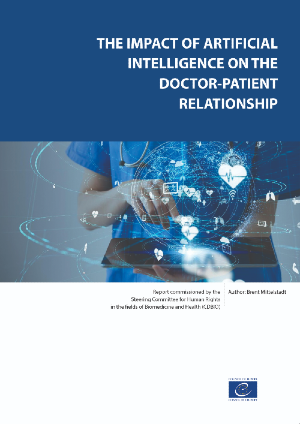The impact of artificial intelligence on the
doctor-patient relationship
by Consultant expert Brent Mittelstadt, Senior Research Fellow and Director of Research at
the Oxford Internet Institute, University of Oxford, United Kingdom

The potential human rights impact of AI on the doctor-patient relationship can be categorised according to six themes: (1) Inequality in access to high quality healthcare; (2) Transparency to health professionals and patients; (3) Risk of social bias in AI systems; (4) Dilution of the patient’s account of well-being; (5) Risk of automation bias, de-skilling, and displaced liability; and (6) Impact on the right to privacy.
[1] Committee replaced by the Steering Committee for Human rights in the fields of Biomedicine and Health (CDBIO).


